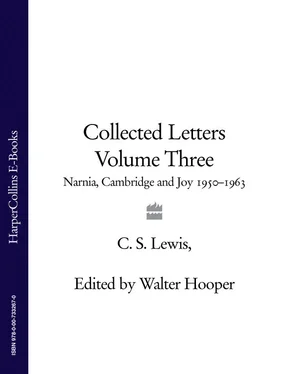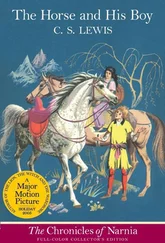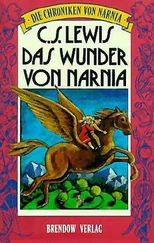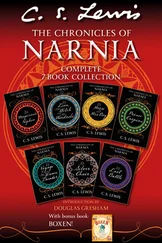My children’s story will be out this Christmas.
With best thanks and all good wishes,
yours sincerely,
C. S. Lewis
TO EDWARD A. ALLEN (W): TS
REF.50/19.
Magdalen College,
Oxford.
1st July 1950.
My dear Mr. Allen,
Many thanks for your amusing letter of the 19th:–
And for the parcel. Westfield seems to specialize in the export of dress suits, and good quality articles too. My brother asks me to say that yours has been much admired, after he had had it altered to conform to English custom by having the turned up cuffs removed. Will you be good enough to thank Mr. Percival for his kindness?
No cocoa thanks; it is about the only thing we have been able to get in any amount we needed, ever since the beginning of the war. Why this should be so, with tea so short, has always been a great mystery to us, for we raise both these commodities within our own ring fence so to speak.
Pilgrim’s Regress and Silent Planet cost 8/6 over here, which, on the devalued £, should make them very cheap books in America.
Glad to hear you defeated Wormwood about even so trivial a matter as buying a car.
You must all be even more worried than we are by the news from the Far East—which does not bear thinking about. My brother—always an optimist—guesses that the Korean war is a large scale diversion to draw all available American and British forces to that theatre as a preliminary for a southward drive through Persia to the Middle East oilfields in 1951: which in its turn is a preliminary to a Russian ‘liberation’ of Western Europe in 1952.
But to return to Tea . We are actually in the proud position at the moment of having enough to see us through for I reckon the next three months: a position we have never been in before. But when our stock is exhausted, I shall most unblushingly remind you of your kind offer.
With all best wishes to your Mother and yourself,
yours sincerely,
C. S. Lewis
TO GEORGE SAYER(W):
Magdalen College
Oxford
10/7/50
My dear George
Warnie is back in the Nursing Home again, alas. I’ve ventured to open yr. letter: he cd. read it but wd. forget it, and he certainly won’t be fit to go to you on Fri. I’ll get him to write to you when he’s cured.
A thousand thanks to you & Moira for yr. perpetual kindnesss. Ora pro nobis. 131
Yours
Jack
TO EDWARD A. ALLEN (W): TS
REF.50/19.
Magdalen College,
Oxford.
21st July 1950.
My dear Mr. Allen,
Attaboy! (Though I believe that expression is now completely old fashioned, or ‘classical’ American). Twenty one pounds four ounces of solid satisfaction, posted by you on the 19th of June, arrived here in the usual perfect condition this morning. How do you do it? I don’t refer so much to your kindness, remarkable though that is, as to the skill and labour which you put into the actual packing. Most of us I fear in your position would have been the seed on stony ground 132 –would have packed enthusiastically for three months or so, and then said ‘Oh bother it’ or some less parliamentary expression! Whereas you keep on keeping on.
Does your government give you any information about the world situation? Ours steadily refuses to part with any, and consequently we live in a world of rumours and astonishing stories from the man who has a friend in the Navy or the Foreign Office or what have you. All that has become obvious is that your country is committed to what may be called a major-minor war, and you have our heartiest sympathy; what we are to do to help is not at the moment very obvious. If we move troops or ships from Singapore or Hong Kong, China would no doubt be ordered to stage a large scale attack on our depleted garrisons. I see the latest Russian move is to lay claim to Alaska, but I can hardly believe this is a serious threat: designed don’t you think to panic the American staff into refusing to reinforce the Far East? But what a state the world has got into! One can but hope and pray.
With best thanks and all good wishes to yourself and your mother,
Yours sincerely,
C. S. Lewis
TO VERA MATHEWS (W): TS
REF.50/81
Magdalen College,
Oxford.
21st July 1950.
My dear Miss Mathews,
Once more I have the pleasant job of thanking you for your kindness; your welcome gift, posted on the 20th. of last month, arrived here in good order this morning—and will perform its accustomed, or rather I should say the accustomed function of spreading satisfaction throughout the household. Such satisfaction looks like being about the only material one to which we have to look forward.
I see in one of the papers this morning that our government’s reaction to the Korean tragedy is to look forward to ‘an early return to a full austerity’. They may not be able to find money, or troops, or ships, but trust them not to neglect that side of the international effort!
Seriously though, we all sympathize with you in the position into which you have been forced; it’s all very well to call it a UNO war, but so far as I can gather, it is a USA war. Have you noticed the French contribution? One gunboat!
With all best wishes,
yours sincerely,
C. S. Lewis
TO WARHELD M. FIROR(BOD):
Magdalen
26th July 1950
My dear Firor
Well, the sky darkens again. We feel rather ashamed here that you should this time be in it before us; and still more ashamed by anticipation of what our government may do and not do. You will perhaps have read already in the papers that their only move so far has been a lot of gas about ‘civil defence’ (all v. well as far as it goes, but they ought to be arming) and a resolution to seize this golden opportunity of stealing a few more of our liberties from us. Try not to judge us by our rulers. There is another side to the picture.
The other day I was listening to some working men talking in a pub. They were all of such ages as to have seen two wars and fought in one. One would have expected (and indeed excused) the attitude ‘Oh, not a third time! Three times in my life is too much.’ But there was not a trace of it. Merely a unanimous, and quite unemotional, view that ‘I’ reckon these—Russians are going the same—way as ‘Itler did’ and ‘We don’t want no bloody Appeasement this time’ and ‘The sooner they’re taught a lesson the better.’ Of course it is partly ignorance: they don’t know anything about the resources of the Russians. But then it was equally ignorance last time; they had no conception of Germany’s strength. But anyway, they’re obviously perfectly game.
Do you think ‘wishful thinking’ is as dangerous as people make out now-a-days? All our people (I don’t know about yours?) got through the miseries of the last war by a series of wishful delusions. They always thought it was going to be over next month or next spring or next year. Did this do harm? I am inclined to think it helped them to get through bit by bit what they couldn’t have faced at all if they had formed any true estimate of its extent. And I think I remember something like that as a boy—successfully completing a walk far too long for one and feeling ‘If I’d known it was that length I could never have done it at all.’ I suspect that modern psychology—at least, modern semi-popular psychology—plays about with the reserves of the soul very dangerously.
I am spending most of my time at present ploughing through back numbers of learned periodicals less in the hope of fresh knowledge than in the fear I’ve missed something. 133 In your subject, which is experimental, I suppose one doesn’t have to poke back so far, because everything before a certain date wd. be definitely superseded. With us literary blokes of course this absolutely decisive ‘supersession’ occurs only very rarely—say, as the result of a windfall like the discovery of a new MS., and views often disappear not because someone has proved them false but merely because they have gone out of fashion. In any forgotten article the really illuminating thing might lie hid: tho’ about 90 to 10 against. So that I mainly pass the hours reading rubbish. The worst rubbish being the pseudo-scientific—the attempt to apply, or the pretence of applying, the methods of your disciplines to ours .
Читать дальше












